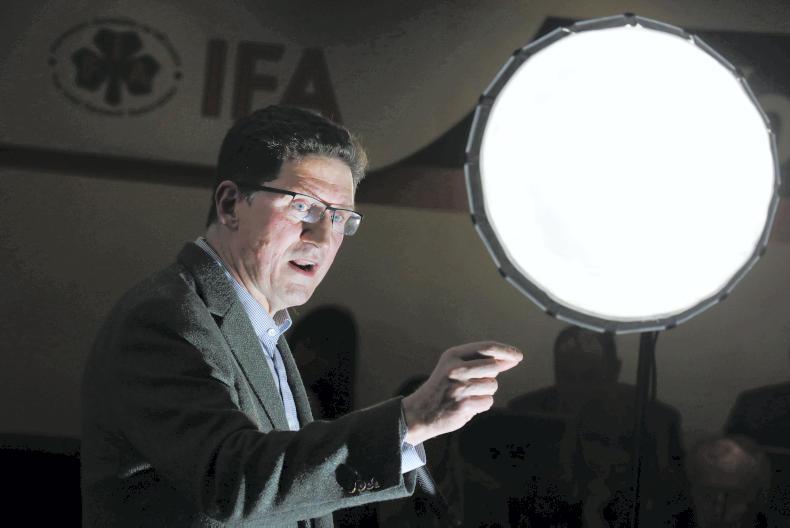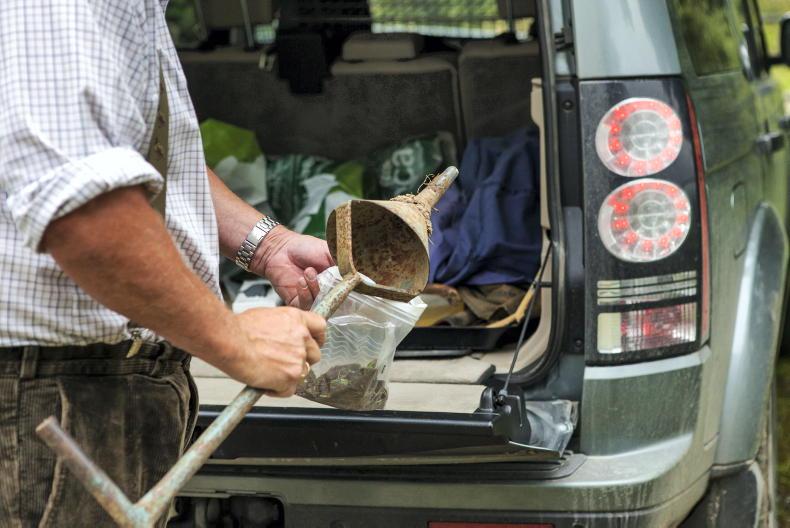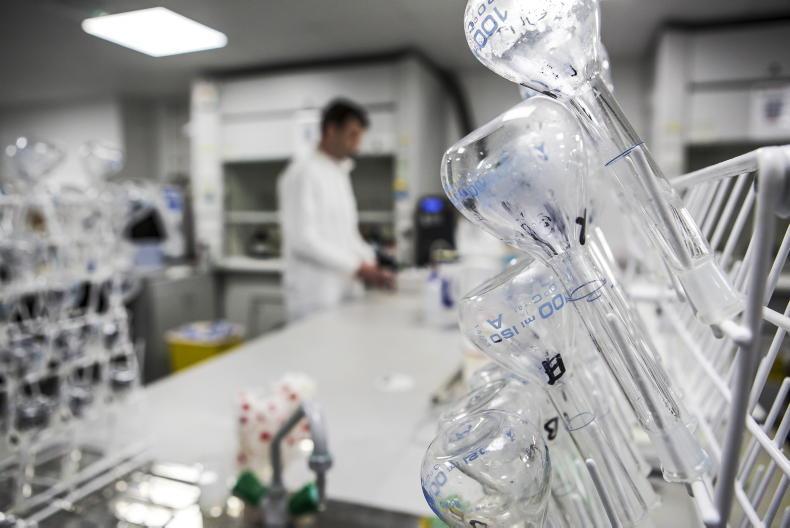Government formation talks have dominated the political agenda in the past week. Attention has focused on the 17 demands set out by the Green Party. Party leader Eamon Ryan has made a commitment to reducing carbon emissions by 7% a red-line issue – a doubling of the commitments in the current Climate Action Plan.
It is a red line that has serious implication for farmers and rural Ireland. Green Party members are citing a reduction in the national cattle herd as a key target. In their election manifesto, a phasing out of the nitrates derogation and live exports were identified as party policy.
Despite the potential implications, rural TDs from Fianna Fáil and Fine Gael have largely remained tight-lipped on the impact that the demands of the Greens would have on rural Ireland. Perhaps the lure of future ministerial appointments or committee chairs is helping to ensure party lines are maintained.
We interview independent TD Denis Naughton this week. As former Minister for Communications, Climate Action and Environment, he is well positioned to understand the implications of a commitment to reduce carbon emissions by 7%. He exposes the aspirational nature of the Greens’ 7% demands.
As Colm McCarthy writes, it is unfortunate that these demands deflect from the components of the Green Party position that could strengthen national policy.
The €76m EU budget should be measured against the €17.5bn package provided to US farmers
From a farmer’s perspective, the real issue is not emissions targets. Most would support an ambitious climate plan. The issue is the lack of a science-based approach when it comes to calculating net emissions.
Lorcan Allen highlights research in Northern Ireland in this week's edition. It points to the fact that Irish soils could be sequestering up to 11 mega tonnes of carbon every year – the equivalent of 40% of all carbon emissions from agriculture. Under current methodology, the sector gets no credit for this.
If, in line with the Green’s demands, there is going to be a major revision of emission targets, then it should be aligned to a complete overhaul of how we calculate net emissions – reflecting the sequestration of carbon in soils and an improved understanding of biogenic methane. In their response to the Green Party, the leaders of Fianna Fáil and Fine Gael acknowledge the need to set correct targets for biogenic methane.
Of course, for many farmers, government talks are not on the radar. Most are focused on trying to maintain their business in the face of a price collapse that has pushed profit margins deep into the red. Farmers selling cattle at a base price of just €3.50/kg are hardest hit.
As we report, measures announced by the European Commission will do little to support beef farmers. They should help stabilise dairy markets. The effectiveness of the €76m budget allocated to the EU-wide scheme should be measured against the €17.5bn package provided to US farmers. We should recognise that the US operates a federal taxation system that can fund such expenditure, whereas EU budgets depend on contributions from member states.
Nevertheless, with some states pumping billions into the agricultural sector and others benefiting from a collapse in domestic currencies, the ability of EU farmers, who have to comply to the highest production standards in the world, to compete in global markets or with non-EU imports has evaporated.
Despite the EU scheme falling well short of what is required, Fianna Fáil, Fine Gael and Sinn Féin are reluctant to even acknowledge the income pressure that COVID-19 has created for some farmers. It is too easy to simply blame government formation talks as a distraction. These farmers deserve the same support from the State as was provided to the wider workforce.
Meanwhile, Brexit negotiations continue to stumble towards a no-deal. It is worth reminding ourselves of the financial consequences – €1.7bn hit to Irish food exports to the UK according to Minister Creed. Former Taoiseach John Bruton gives a sobering view on the state of play and the risk that the economic slump created by COVID-19 could be seized upon by the UK prime minister as an opportunity to cover up the financial impact of a hard Brexit.
Whatever form it takes, the next government will face one of the toughest periods to confront any new administration. The COVID-19 recovery strategy and Brexit planning must take centre stage in the coming weeks when the programme for government is being formulated. Failure in these would mean the Greens’ target of a 7% reduction is achieved by economic collapse, which is the least sustainable outcome of all for farmers and environmentalists.

\ Jim Cogan
Environment: climate credit scheme and eco-payment
Farm organisations reacted angrily to details of the new climate credit scheme outlined in last week’s Irish Farmers Journal. It is hardly surprising given that the scheme, which is at an advanced stage, appears to have been developed in the background by Bord Bia and Teagasc with limited input from or engagement with farmers.
The approach has raised concerns of yet another scheme being introduced that underpins income for a wide range of service providers but with no evidence that it will deliver increased income for farmers.
This was a regular criticism of the Knowledge Transfer scheme, which delivered a multimillion euro dividend to Teagasc in recent years. The extent to which it delivered for farmers is less clear. After facilitation fees, the net cash contribution to farm income was relatively modest. However, we should acknowledge the value of the technical content that was disseminated through the groups.
With a significant element of the proposed climate credit scheme clearly designed to replace the Knowledge Transfer scheme, the impact of this technical content on farm incomes should be independently verified with a value-for-money audit completed before further investment.
At a basic level, the number of farmers completing profit monitors and recording grass growth pre and post the multimillion farmer investment in the scheme would prove a useful indicator. Beyond this, the concept of having a platform in place that allows farmers receive credits for engaging in enhanced environmental measures is positive. At an industry level, it provides a solid defence against those with an agenda to undermine the extent to which the agricultural sector is working across a range of areas to address climate change issues.
For farmers, although the dividend in terms of market prices is unclear, those participating in the proposed scheme should automatically be credited and qualify for payment under any future eco-scheme introduced under the next CAP. However, the decision as to what measures deliver the best environmental and economic dividend should rest with the farmer and not be determined through mandatory conditions and effective charges within the scheme.
Trade: strengthening alliances
It was disappointing to hear NFU president Minette Batters take issue with Irish beef on sale in British supermarkets. As well as a centuries-old tradition, Britain produces 25% less beef than it consumes. Ireland, with similar production standards and costs, is the natural and closest trading partner to meet this deficit. It is also a two-way trade between the UK and Ireland with an estimated €4.5bn of agri-food products exported from the UK into Ireland each year.
UK and Irish farmers are facing a particularly tough time at present. But the solution won’t be found by protesting against trade between us, irrespective of the product or direction of travel.
With Brexit on the horizon, it has never been more important to strengthen alliances between British and Irish farmers in a bid to protect the value of the market.

BEEP applications slower than expected
As Adam Woods reports, applications for the new BEEP scheme have been slow. With just 11,487 applications – 20% of the country’s 55,000 suckler farmers – it’s a disappointing start. Schemes like this are important to support farmers through difficult times but are equally important in the bigger picture of justifying support for the sector based on farmer uptake. Campaigns for suckler supports are slow and hard-fought. A fully subscribed BEEP scheme will strengthen the minister’s hand in justifying further support in the future. The scheme is relatively simple with low compliance costs. All suckler farmers should apply.
Government formation talks have dominated the political agenda in the past week. Attention has focused on the 17 demands set out by the Green Party. Party leader Eamon Ryan has made a commitment to reducing carbon emissions by 7% a red-line issue – a doubling of the commitments in the current Climate Action Plan.
It is a red line that has serious implication for farmers and rural Ireland. Green Party members are citing a reduction in the national cattle herd as a key target. In their election manifesto, a phasing out of the nitrates derogation and live exports were identified as party policy.
Despite the potential implications, rural TDs from Fianna Fáil and Fine Gael have largely remained tight-lipped on the impact that the demands of the Greens would have on rural Ireland. Perhaps the lure of future ministerial appointments or committee chairs is helping to ensure party lines are maintained.
We interview independent TD Denis Naughton this week. As former Minister for Communications, Climate Action and Environment, he is well positioned to understand the implications of a commitment to reduce carbon emissions by 7%. He exposes the aspirational nature of the Greens’ 7% demands.
As Colm McCarthy writes, it is unfortunate that these demands deflect from the components of the Green Party position that could strengthen national policy.
The €76m EU budget should be measured against the €17.5bn package provided to US farmers
From a farmer’s perspective, the real issue is not emissions targets. Most would support an ambitious climate plan. The issue is the lack of a science-based approach when it comes to calculating net emissions.
Lorcan Allen highlights research in Northern Ireland in this week's edition. It points to the fact that Irish soils could be sequestering up to 11 mega tonnes of carbon every year – the equivalent of 40% of all carbon emissions from agriculture. Under current methodology, the sector gets no credit for this.
If, in line with the Green’s demands, there is going to be a major revision of emission targets, then it should be aligned to a complete overhaul of how we calculate net emissions – reflecting the sequestration of carbon in soils and an improved understanding of biogenic methane. In their response to the Green Party, the leaders of Fianna Fáil and Fine Gael acknowledge the need to set correct targets for biogenic methane.
Of course, for many farmers, government talks are not on the radar. Most are focused on trying to maintain their business in the face of a price collapse that has pushed profit margins deep into the red. Farmers selling cattle at a base price of just €3.50/kg are hardest hit.
As we report, measures announced by the European Commission will do little to support beef farmers. They should help stabilise dairy markets. The effectiveness of the €76m budget allocated to the EU-wide scheme should be measured against the €17.5bn package provided to US farmers. We should recognise that the US operates a federal taxation system that can fund such expenditure, whereas EU budgets depend on contributions from member states.
Nevertheless, with some states pumping billions into the agricultural sector and others benefiting from a collapse in domestic currencies, the ability of EU farmers, who have to comply to the highest production standards in the world, to compete in global markets or with non-EU imports has evaporated.
Despite the EU scheme falling well short of what is required, Fianna Fáil, Fine Gael and Sinn Féin are reluctant to even acknowledge the income pressure that COVID-19 has created for some farmers. It is too easy to simply blame government formation talks as a distraction. These farmers deserve the same support from the State as was provided to the wider workforce.
Meanwhile, Brexit negotiations continue to stumble towards a no-deal. It is worth reminding ourselves of the financial consequences – €1.7bn hit to Irish food exports to the UK according to Minister Creed. Former Taoiseach John Bruton gives a sobering view on the state of play and the risk that the economic slump created by COVID-19 could be seized upon by the UK prime minister as an opportunity to cover up the financial impact of a hard Brexit.
Whatever form it takes, the next government will face one of the toughest periods to confront any new administration. The COVID-19 recovery strategy and Brexit planning must take centre stage in the coming weeks when the programme for government is being formulated. Failure in these would mean the Greens’ target of a 7% reduction is achieved by economic collapse, which is the least sustainable outcome of all for farmers and environmentalists.

\ Jim Cogan
Environment: climate credit scheme and eco-payment
Farm organisations reacted angrily to details of the new climate credit scheme outlined in last week’s Irish Farmers Journal. It is hardly surprising given that the scheme, which is at an advanced stage, appears to have been developed in the background by Bord Bia and Teagasc with limited input from or engagement with farmers.
The approach has raised concerns of yet another scheme being introduced that underpins income for a wide range of service providers but with no evidence that it will deliver increased income for farmers.
This was a regular criticism of the Knowledge Transfer scheme, which delivered a multimillion euro dividend to Teagasc in recent years. The extent to which it delivered for farmers is less clear. After facilitation fees, the net cash contribution to farm income was relatively modest. However, we should acknowledge the value of the technical content that was disseminated through the groups.
With a significant element of the proposed climate credit scheme clearly designed to replace the Knowledge Transfer scheme, the impact of this technical content on farm incomes should be independently verified with a value-for-money audit completed before further investment.
At a basic level, the number of farmers completing profit monitors and recording grass growth pre and post the multimillion farmer investment in the scheme would prove a useful indicator. Beyond this, the concept of having a platform in place that allows farmers receive credits for engaging in enhanced environmental measures is positive. At an industry level, it provides a solid defence against those with an agenda to undermine the extent to which the agricultural sector is working across a range of areas to address climate change issues.
For farmers, although the dividend in terms of market prices is unclear, those participating in the proposed scheme should automatically be credited and qualify for payment under any future eco-scheme introduced under the next CAP. However, the decision as to what measures deliver the best environmental and economic dividend should rest with the farmer and not be determined through mandatory conditions and effective charges within the scheme.
Trade: strengthening alliances
It was disappointing to hear NFU president Minette Batters take issue with Irish beef on sale in British supermarkets. As well as a centuries-old tradition, Britain produces 25% less beef than it consumes. Ireland, with similar production standards and costs, is the natural and closest trading partner to meet this deficit. It is also a two-way trade between the UK and Ireland with an estimated €4.5bn of agri-food products exported from the UK into Ireland each year.
UK and Irish farmers are facing a particularly tough time at present. But the solution won’t be found by protesting against trade between us, irrespective of the product or direction of travel.
With Brexit on the horizon, it has never been more important to strengthen alliances between British and Irish farmers in a bid to protect the value of the market.

BEEP applications slower than expected
As Adam Woods reports, applications for the new BEEP scheme have been slow. With just 11,487 applications – 20% of the country’s 55,000 suckler farmers – it’s a disappointing start. Schemes like this are important to support farmers through difficult times but are equally important in the bigger picture of justifying support for the sector based on farmer uptake. Campaigns for suckler supports are slow and hard-fought. A fully subscribed BEEP scheme will strengthen the minister’s hand in justifying further support in the future. The scheme is relatively simple with low compliance costs. All suckler farmers should apply.











SHARING OPTIONS